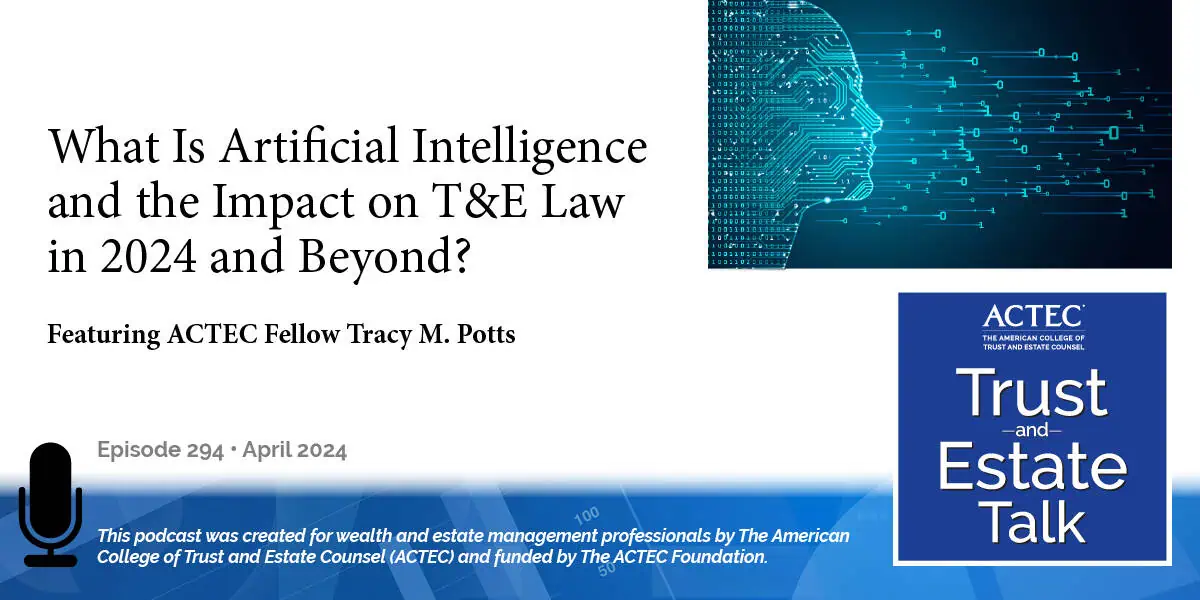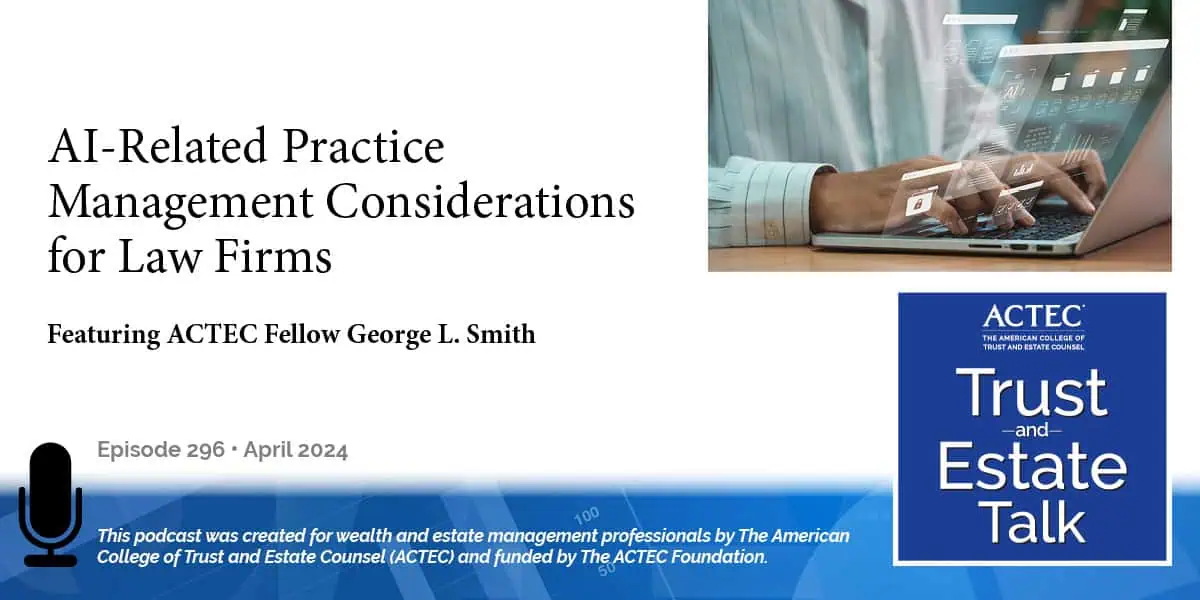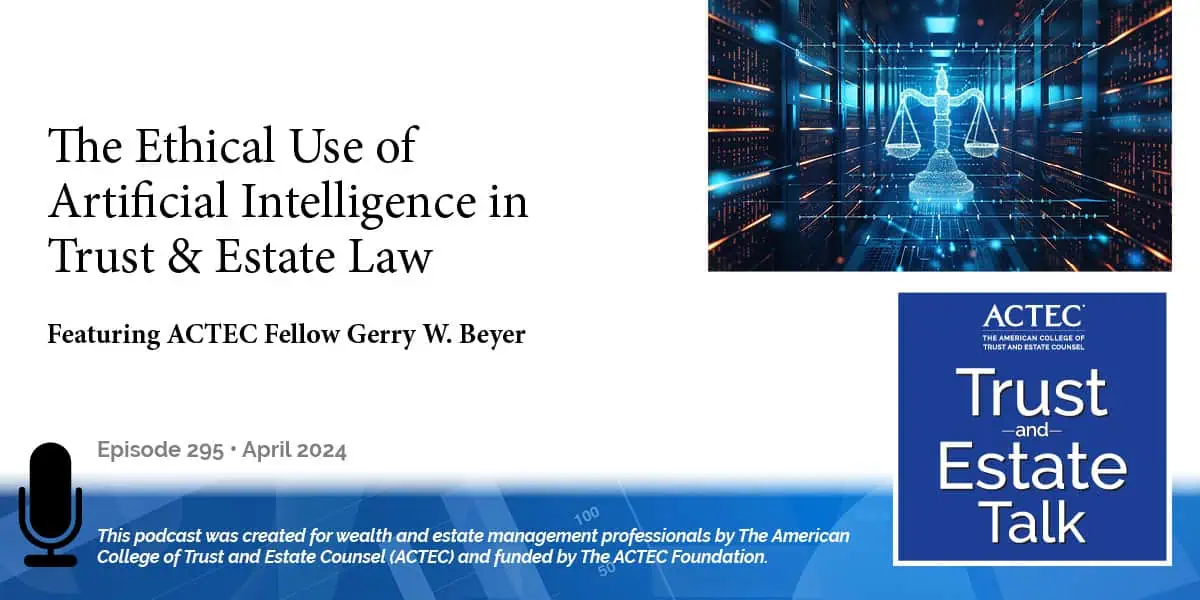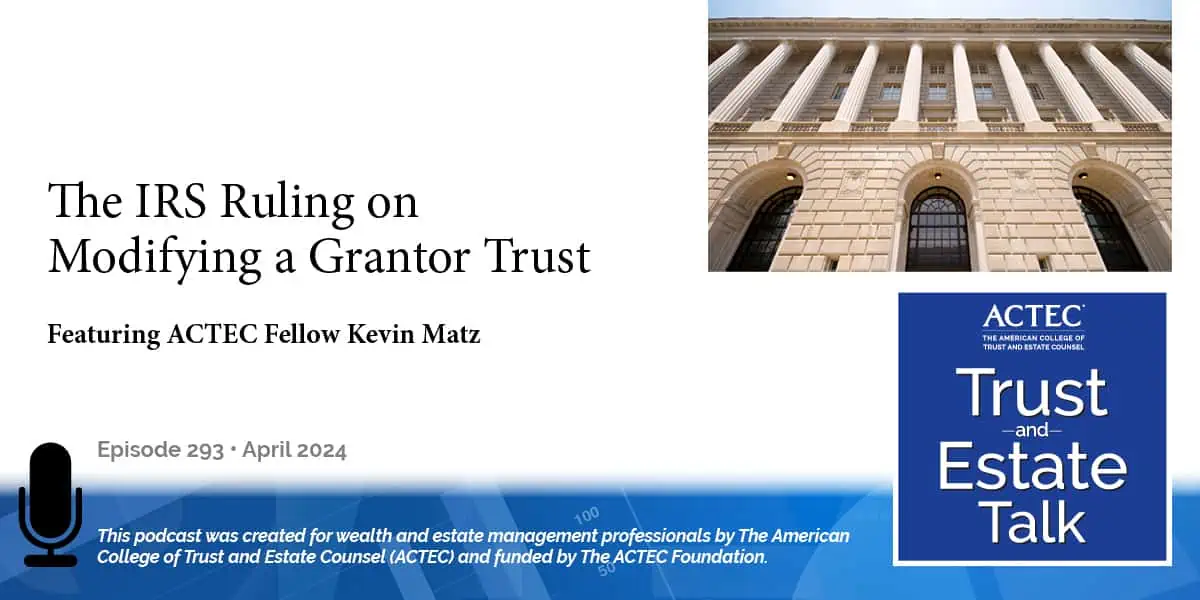What Is Artificial Intelligence and the Impact on T&E Law in 2024 and Beyond?

“What Is Artificial Intelligence and the Impact on T&E Law in 2024 and Beyond?” That’s the subject of today’s ACTEC Trust and Estate Talk.
Transcript/Show Notes
This is Travis Hayes, ACTEC Fellow from Naples, Florida. Artificial intelligence is impacting the digital domain and industry and various other aspects of our daily lives. But how is it affecting trust and estate law? And what can we expect in the future?
This is such an important topic that the ACTEC Trust and Estate Talk is devoting four podcasts to better understand AI’s impact on our profession. ACTEC Fellow Tracy Potts of Sacramento, California, who is the current chair of the College’s Artificial Intelligence Task Force, joins the ACTEC Trust and Estate Talk today to tell us what artificial intelligence is and what the series of podcasts will help explain. Welcome, Tracy.
Introduction: Types of Artificial Intelligence
Tracy Potts: Thank you. I want to start with what is artificial intelligence and how we are seeing it in our current practices. Basically, we have lots of different types of artificial intelligence. When you look at articles on artificial intelligence, it will describe it in many ways.
Reactive Artificial Intelligence (AI)
So, the first is that there’s reactive artificial intelligence. It has been around for a long time. It basically is a machine that is mimicking what you do. And it can repeat that mimic over and over and over. And it can do it at a very fast rate. Reactive artificial intelligence has been in industries such as manufacturing, where it’s a machine that puts the same rivet on every single time. It also is in our area of law because it is in predictive models occasionally.
Artificial Narrow Intelligence
The other area that we often see and have all been using for a very long time is artificial narrow intelligence. Artificial narrow intelligence is basically voice-activated intelligence. We’ve all been using Siri, we’ve all been using Alexa; all of those are artificial narrow intelligence. Basically, we are using an intelligence that can perform a specific task based on a verbal prompt that we give it. Often, we’ll probably see it in our smart homes, we might even start seeing it in our practices where we can give voice commands to computers for them to perform specific tasks.
Limited-Memory Artificial Intelligence
We also have limited-memory artificial intelligence. Limited memory artificial intelligence is emulating a human’s brain. It’s responding to stimuli. And it’s learning from recent data. It is a self-driving car. It is something that allows you to do certain things, and then it is learning and doing it better the next time, which is important for artificial intelligence. It’s the learning models that are important to us in the trust and estates field.
Predictive Artificial Intelligence
The other type of artificial intelligence- and this is already being used in our practices- is predictive artificial intelligence. Predictive artificial intelligence has been used by litigators to help predict how a jury could respond based upon historical data. It also can be used to predict what judges will rule in certain cases. It can go through massive amounts of data in a very short period of time and give you a predictive analysis. There are programs that are already out there that can do those things. But the ones that we use in our daily lives that we all use for predictive artificial intelligence is when we go to the internet and browse articles, the predictive artificial intelligence has already picked what it thinks we want to read. Predictive artificial intelligence is there. It’s also on your Netflix and your Amazon Prime accounts telling you which movies you’ll like. So, it is part of our daily lives and we are using it on a daily basis.
Generative AI
The one that has really heightened the people’s hype about artificial intelligence and is really going to make the most impact in our world is the last type of artificial intelligence and that is generative AI. Generative AI is the revolution. And they say that on November 30th of 2022, we hit the intelligence revolution. That is because that is the first time that chat GPT was released on the internet and the public actually had access to that generative AI. Now generative AI is a machine that uses huge volumes of data to create new text. So that’s the important part.
Generative AI can create. It is the first artificial intelligence that does not use a data set to mimic what it has, but it’s the first artificial intelligence that can create. It can create text and it can create new images. Now we have a type of AI that will impact the trust and estates field because it will start doing drafting for us and correcting drafting for us and proposing drafting for us. So that is why generative AI has been so important. And when we started the revolution, we just knew about chat GPT. Since that time, chatbots- which is what generative AI uses- have exploded. And we’re all familiar with using chatbots. When we go shopping online, the little chatbot pops up and says, “may I help you?”
That is generative AI, but what we’re talking about is much broader than that. Generative AI is now going to be in every program that we use. It’s already in our Excel program. So, when you screw up a formula and the Excel program says, “may I fix that for you?” That’s generative AI. When your Word document says, “here’s how you should finish this sentence,” that’s generative AI. When your Outlook program pops in and says, “do you want to email so-and-so,” it finishes your sentence, or it gives your sincerely or however, you normally end your correspondence or your emails. That’s all generative AI and it’s already there. Now what we will see is that’s going to expand tremendously. And it’s going to be in more programs.
Current Applications of Artificial Intelligence in Legal Practice
And we’re going to have to spend a lot of time educating ourselves and learning about generative AI. And you’re going to have to decide, as it’s going to be explored in a future podcast, about how you’re going to allow AI to be used in the future. You will have to decide because generative AI stores all the data that you’re putting in it in most programs. They are open programs.
They’re learning from the data. And they’re not distinguishing between, well, Tracy told me this so I can only release that information to Tracy. It’s going to be that I’m going to learn from what Tracy told me and I’m going to tell Travis. So, you have to be careful. We’re going to talk about that in our later podcast about using AI and making sure that it’s learning from you, but it’s not learning from you about specifics about your clients or any of those kinds of things.
The other ones that have been far along that we’re going to be using in our everyday practice and are already available to us are Thomson Reuters West and Lexus Nexus have both incorporated artificial intelligence in their search engines. We have watched those throughout the task force period of time and had them demonstrate those products, and it’s just helping you locate something that you might not have thought of in your research, and it just expands upon your research and helps you think about other things. Those products have started becoming fairly reliable, especially the Thomson Reuters West one.
It is not hallucinating at the rate that some of the other programs are. And when you talk about AI and you talk about hallucinations, a machine does not actually hallucinate, a machine lies. So when a machine lies to you and tells you something that is completely inaccurate, that means that the machine is hallucinating, as the term of art is used. As a program develops more and more, it hallucinates less and less.
Another thing, we’re going to see products explode in the next year, to year and a half that are going to start being directed towards trust and estates practice. And that is an important thing for you to start trying to figure out how you’re going to integrate those practices.
The Evolution of Artificial Intelligence: Past, Present, Future
Now let’s talk a little bit about the future. Where are we? Because the development of AI is still in its infancy and I will tell you the reason it’s in its infancy is because it has just been released. But even though it’s been released, it’s moving fast. For example, when Chat GPT was originally released in November of 2022, it basically had the cognitive ability of approximately a two-year-old. By the end of last year, Chat GPT’s cognitive ability had increased to a nine-year-old. So that is in a little over a year, it has grown its cognitive ability significantly. And we’re just going to see that expand and expand and expand. And we’re going to be getting to the next areas of development of artificial intelligence.
Theory Of Mind Machines
First, there’s the theory of mind machines. The theory of mind machines basically is about how they develop inferences, they have intuition, and they can determine outcomes; they’re similar to human cognition. So generative AI is getting close to being a theory of mind, as are the other generative AI products. But we’re not quite there where we have a fully developed human cognition type of machine.
Artificial General Intelligence
The other area that we don’t have yet is artificial general intelligence, which other people refer to as singularity or sometimes self-awareness. That’s when the machine basically develops human emotions and judgments. Now in talking to developers about AI, AI will have to eventually develop this. The reason that the human brain is so unique is that because it has part of our brain is emotion and part of our brain is logic, which is very important for us to be able to regulate ourselves and not be sociopathic. In order to develop an AI that is not sociopathic, it has to develop emotions and feelings for it to regulate itself and become similar to humans. So it is not there and it’s not expected to be there for a little while. But there are predictions that it’s going to be as early as 2030 for us to get to where we have machines that have singularity.
Artificial Superintelligence
The other area is artificial superintelligence. Now, developers have already been working on artificial superintelligence and they can’t really get there on artificial superintelligence until they get there on singularity. The reason for that is it’s going to be a machine that can have that balance and regulation, but it’s going to be billions of times smarter than us. So it is eventually, it’s expected that we can get there. But really, most people believe that we can’t get there. We don’t want Sky Net; we don’t want to get there. Most people believe that singularity has to happen before we can ever get to super intelligence.
Practical Considerations for Integrating AI into Legal Practice
So, how do you use AI in your practice? You’re going to be using it for asking questions. You’re going to make sure that you’re asking specific questions. You’re going to be asking it if you want it to give you an empathetic response. Remember, it’s mimicking you. So, you need to ask it in an empathetic way. You want to target your audience for the response that you’re going to get, so you’re going to ask the question in a way that you’re targeting it.
You’re going to look for hallucinatory responses because you can’t rely- you’ve got to make sure you verify because it’s still two-year-olds lie a lot where it started, and nine-year-olds still don’t always tell the truth. So we’re going to have where it has not reached the maturity to say, I don’t know. And so it’s going to, its mission is to answer your question. It’s going to give you false information. You’re going to treat it like a treatise. It’s not going to be exactly what you’re looking for, but it’s going to lead you in the right direction. So that’s what you’re really using it for.
Remember, when you’re asking it stuff, don’t give it any information about your client because you don’t want that to be part of your data set. Then you’re going to be incorporating these AI products into your practices and I want you to be aware of a few things.
One is you’re not going to be using your laptop in public anymore if you’re working on a client document. And the reason for that is that AI can listen to your keystrokes and with 95% accuracy, it can replicate those. So we’re just all going to have to be a little bit more self-aware of what our environment is and who’s listening. And we don’t know if the person next to us on their laptop doesn’t have an AI program that’s duplicating what we type. So we’re just going to have to be a lot more conscious of where we’re working and who can listen.
We’re also going to have to be careful about deepfakes. We’re going to have to work with our clients and figure out, is that really my client on the phone? Or is that somebody that’s deepfaking my client’s information and telling me to make a change? So we’re just going to have to put some safety parameters in place to make sure that when we’re getting calls from clients, we’re getting calls from real clients.
Then lastly, when we’re bringing in products, we want to make sure that we’re getting everything we possibly can in the product. We want to make sure that if we’re buying a vendor product, we want to understand what kind of AI is being employed in this product. Is it generative AI? Is it learning from my data set? Is it using my data to teach somebody else in the industry that’s using the same product? How was my AI originally trained? Is the data that it’s trained on sufficient? Is it going to actually give you real responses? Is it years old? Is it actual, current information? Or was it just scraped from the internet? Because we all know there’s so many false information things on the internet.
We also want to know, was the data stolen? Was it licensed? Are we using somebody’s copyrighted work? Then, if I put information in AI can my associate down the hall figure out what I was asking our AI? Who’s accessing that information? Then, basically, when it’s accessed, what can they do with it?
We have policies in place that are going to prevent abuse of AI in our office. How can I prevent somebody who is abusive from actually training our AI? Because we don’t want our AI to become abusive. So, we want to make sure that if there is someone in the office who is mistreating the AI, the AI is not learning from that person. So, we want to restrict who’s able to teach the AI.
Is the AI biased? Is it going to be giving me different information depending on who it sees as the client? And will my AI, once I buy this product, is it going to get smarter? Is it going to stop hallucinating as much? Will it become more accurate the more data that I put into it? And how long is it going to take me to make money on this product? Is it going to be such an investment that I just can’t spend the time doing it? So, with that, I’ll just turn it back to you, Travis.
Travis Hayes: Thank you, Tracy, for giving us an overview of artificial intelligence and its potential impact on trust and estate law. Please join us on our next podcast when we hear from Professor Jerry Beyer regarding the ethical use of artificial intelligence in trust and estate law.
You may also be interested in:
- AI and Trust and Estate Law: The Future Is Here to Stay (Jan 2024)
- AI-Related Practice Management Considerations for Law Firms (April 2024)
- Government Regulation of Artificial Intelligence (will post April 30)
A video to share with your clients:
Latest ACTEC Trust and Estate Talk Podcasts

AI-Related Practice Management Considerations for Law Firms
A discussion for law firms about how to incorporate AI in their practice management, including staff considerations, the “billable hour,” and more.

The Ethical Use of Artificial Intelligence in Trust & Estate Law
A law professor offers insights into the risks, rewards, duties and ethical considerations of lawyers using AI in their T&E practices.

The IRS Ruling on Modifying a Grantor Trust
Explore the gift tax implications for trust beneficiaries modifying grantor trusts in IRS CCA 202352018, with nuanced analysis and estate planning insights.

